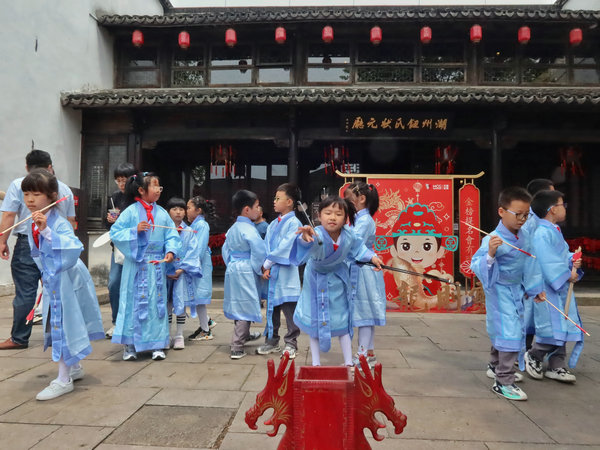A Street Offers a Glimpse into History and Stands as a Beacon of Modernity

A view of Xiaoxi Street. [Photo by Jiang Dong/China Daily]
Nestled within Huzhou, Zhejiang province, Xiaoxi Street stands as a provincial-level historical and cultural protection block, gracefully preserving its rich heritage while seamlessly embracing the essence of modernity.
Adorned with edifices dating back to the late Qing Dynasty (1644-1911) and the early 20th century, this historic enclave, situated alongside the Caodu River, once served as a pivotal nexus for ancient canal transportation. The river, acting as a vital conduit linking the mountainous regions of present-day Jiangsu, Zhejiang, and Anhui provinces with Huzhou city, played a pivotal role in fostering the prosperity of this esteemed block.
Throughout history, Xiaoxi Street attracted esteemed families, affluent merchants, and government officials, resulting in the creation of a multitude of architectural marvels that have stood the test of time.

A market for selling cultural and creative products in Xiaoxi Street in Huzhou, Zhejiang province. [Photo by Jiang Dong/China Daily]
Among these treasures, the residence of Niu Fubao, an eminent Qing Dynasty official who achieved the highest score in the imperial exam to select officials in 1838, stands as a prominent highlight. Constructed during the reign of Emperor Qianlong (1736-96) by a merchant from Huizhou, the complex, showcasing distinctive Huizhou-style architecture, was later acquired by the Niu family. Notably, the complex boasts exquisite stone carvings on its doors and a rare high-level beam structure, meticulously preserved to this day, as affirmed by Lin Xing'er, former director of Huzhou Museum.
Since 2013, the local government has undertaken a comprehensive project aimed at preserving and revitalizing this historic block. Through meticulous restoration efforts, ancient buildings have been lovingly refurbished while retaining their original allure.

Children play touhu, an ancient game in which contestants throw arrows into wine pitchers, at the former residence of Niu Fubao in the block. [Photo by Jiang Dong/China Daily]
Additionally, modern cultural industries, including galleries, pottery-making workshops, and public libraries, have been integrated to infuse youthful vibrancy and vitality into the area, as noted by Wang Yuwen from the company overseeing the block's operations.
Wang further emphasizes, "As a historical and cultural protection block developed in Huzhou, we have breathed new life into each venerable building, transforming the block into a hub of cultural and creative industries."
